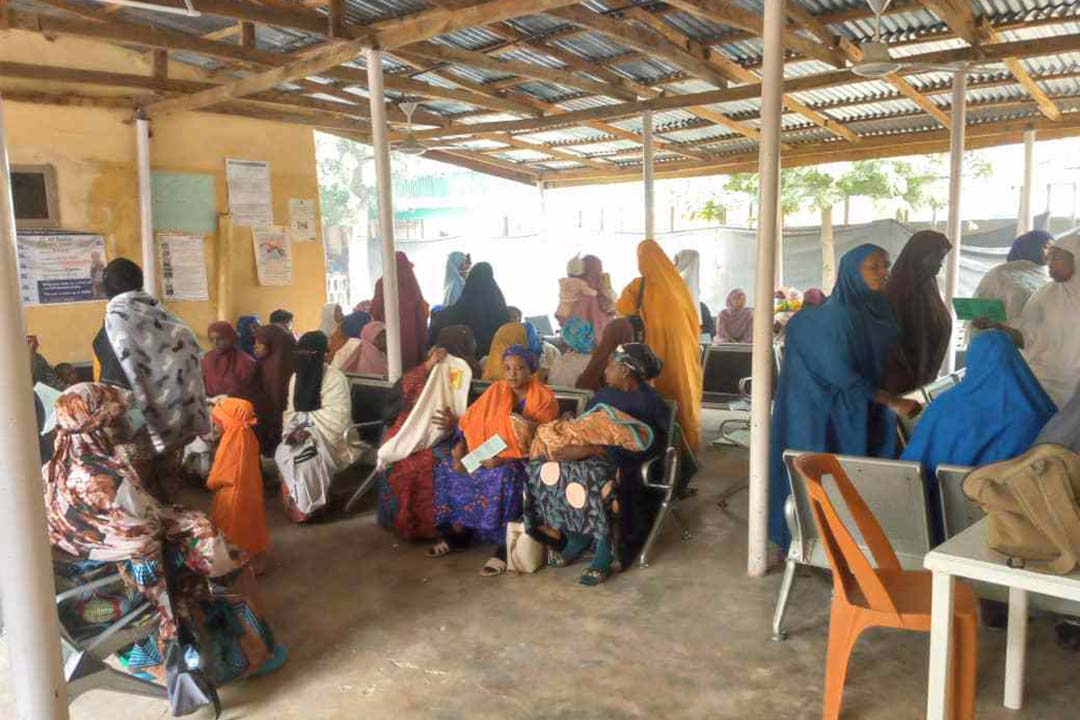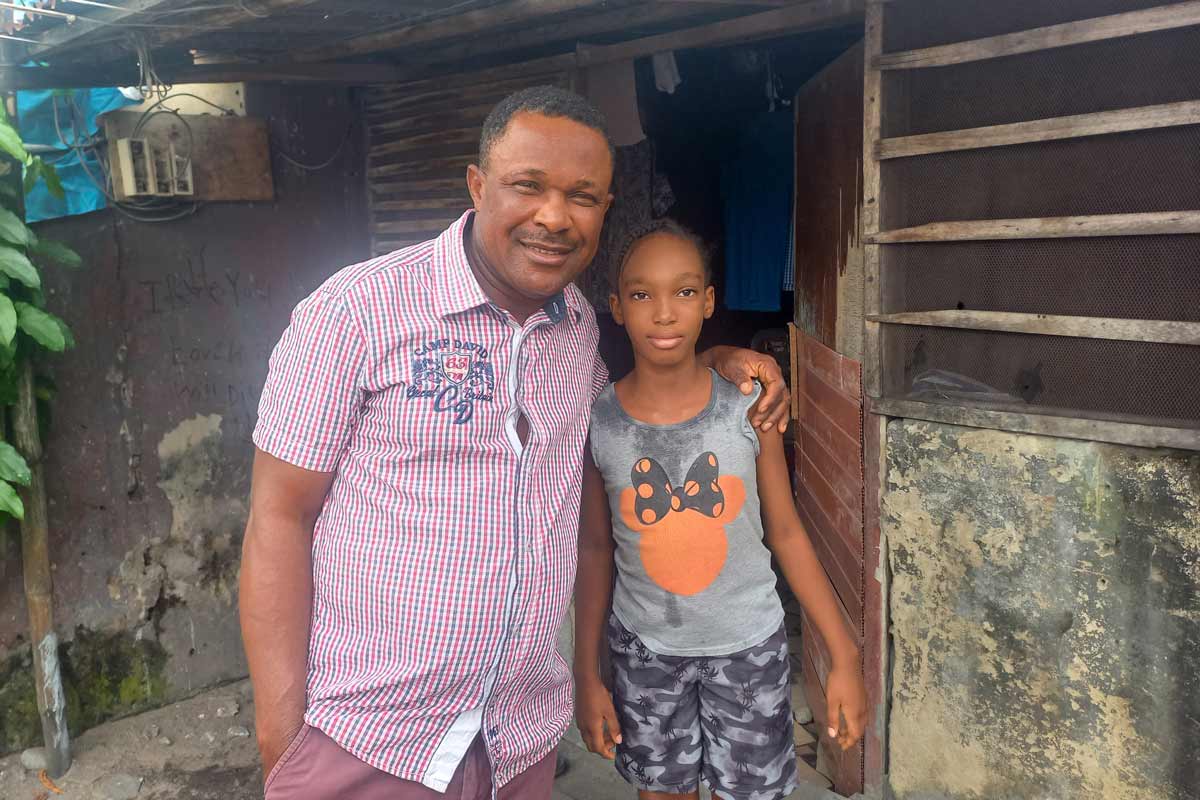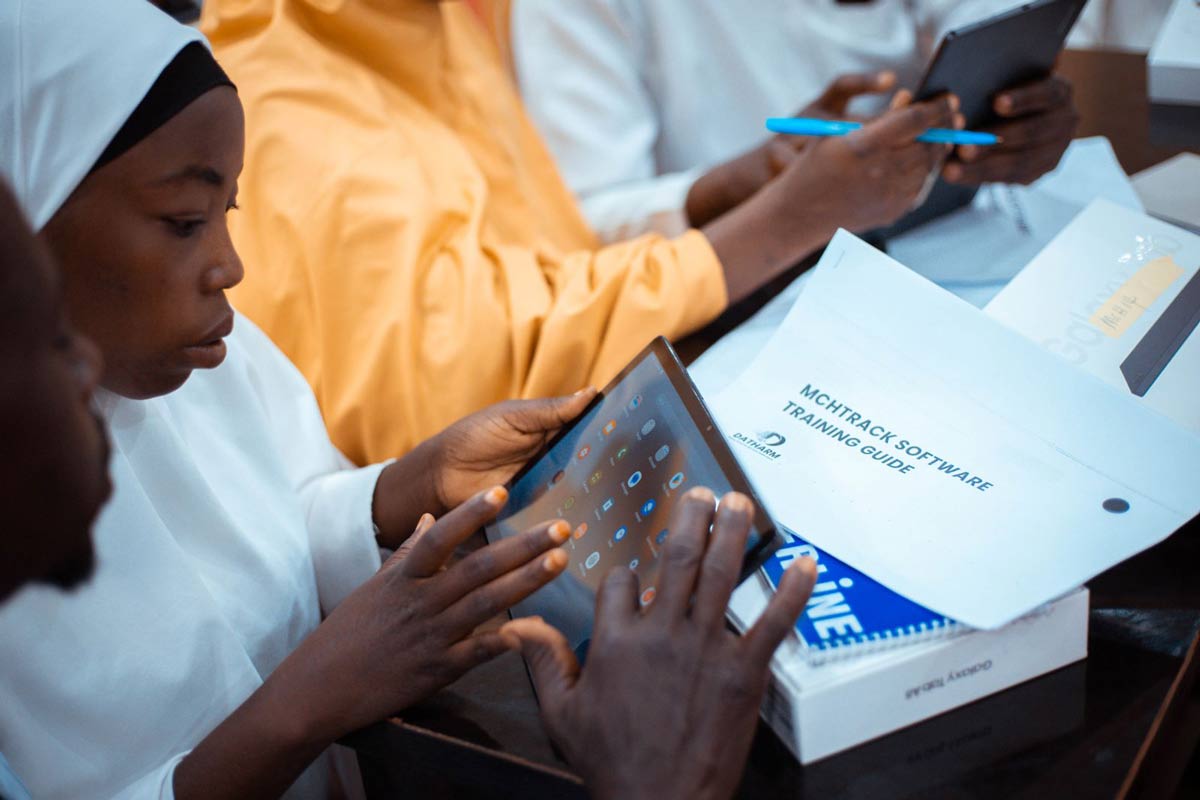“Cashvocacy” boosts immunisation in Nigeria’s north
Health workers say that an NGO-led initiative to pay out just 1,000 naira – about one US dollar – to caregivers who bring their babies in for jabs has had an “amazing” impact.
- 7 February 2024
- 7 min read
- by Afeez Bolaji

It was about noon on Monday, 29 January, when Zainab Sa'adu arrived at Unguwa Uku Primary Health Care centre in Kano, northwest Nigeria. Fifteen-week-old Amina, strapped to Sa'adu's back, was due four sets of vaccines.
A short time later – jabs administered, Amina patted and soothed – Sa'adu was heading for a small office some metres from the immunisation ward. She emerged, beaming with joy, displaying a crisp 1,000 naira (about US$ 1) note.
"This is my third time being here, and I have received 1000 naira on each occasion. I usually spend 100 naira [10 US cents] for transport and use the balance to buy nappies for my daughter."
- Zainab Sa’adu, mother to Amina
"Recently, a neighbour told me nursing mothers who take their children for immunisation at the community PHC get cash. This is my third time being here, and I have received 1000 naira on each occasion. I usually spend 100 naira [10 US cents] for transport and use the balance to buy nappies for my daughter," Sa'adu said.
The money had been handed to her by a field officer of New Incentives-All Babies Are Equal (NI-ABAE), a non-profit organisation that gives disadvantaged nursing mothers living in remote areas small cash incentives to ensure their children can reliably access routine immunisation.

Credit: Nigeria Health Watch
Each carer is eligible for a total sum of 6,000 naira spread across six major immunisation periods. By the time the child reaches 15 months, the carer will have received cash support to get their child protected against polio, TB, diphtheria, tetanus, pertussis, hepatitis B, pneumococcal pneumonia and meningitis, meningococcal meningitis and septicaemia, rotavirus, measles and yellow fever.
Transforming indifferent mums into immunisation advocates
"I didn't take it [immunisation] seriously until the nurses here spoke glowingly about it. So now, beyond the money that motivated me to come in the first place, I have realised how important vaccines are to children," Sa'adu said, adding that she regrets not having taken Amina's older siblings for immunisation.
Like Sa'adu, Khadija Murtala said she been drawn, at first, by the promised cash sum. Now on her second visit to Unguwa Uku PHC with two-month-old Aisha, Murtala was not just keeping her child on schedule with her vaccines, but was advocating for immunisation back home.
“I usually trek to the hospital because my house is not very far from here. So, I use the 1,000 naira to buy cooking ingredients, detergent, and sometimes paracetamol for my baby. With what health officials have told us about immunisation, I think it is something every mother should take seriously even without receiving any incentive.”
- Sadiya Musa, mother
"I was thrilled to hear about the [NI-ABAE] initiative. I use the money for transport, to buy paracetamol, and to get some other items. Because of what I have learned about how important immunisation is to babies' health, I have started appealing to mothers in my neighbourhood to bring their children to hospitals," she says.
At Unguwa Uku Kauyen Alu Health Clinic, about 5km from Unguwa Uku PHC, more than a dozen nursing mothers who spoke to VaccinesWork shared experiences similar to Sa'adu and Murtala's.
"I usually trek to the hospital because my house is not very far from here. So, I use the 1,000 naira to buy cooking ingredients, detergent, and sometimes paracetamol for my baby," said Sadiya Musa, one of the mothers.
"With what health officials have told us about immunisation, I think it is something every mother should take seriously even without receiving any incentive."
Nearly 3 million babies reached
More than 41% of under-five deaths in Nigeria are linked to vaccine-preventable diseases.
The fact that the country's north ranks among the regions with the lowest childhood immunisation rates informed the establishment of NI-ABAE in three northern states – Katsina, Zamfara, and Jigawa – in 2017.
The programme was extended to Kano, the most populous northern state, in 2021, after a randomised controlled trial showed remarkable progress in vaccination rates in communities where NI-ABAE had operated so far. Children in NI-ABAE catchment areas were 27% more likely to be fully immunised than children in control areas, the evaluation had shown.
Misbahu Hamza, NI-ABAE communications officer, says the initiative now works in nine states, including the north-eastern states of Bauchi and Gombe, with 2.7 million infants vaccinated under the programme since inception.
"The All Babies programme began expanding in Kano State in January 2023. It now operates in over 1,200 clinics across all 44 LGAs [of the state], reaching more than 11,000 settlements. Last year in Kano, we enrolled over 300,000 infants and disbursed more than 691 million naira. Across the nine states, we have recorded 1,838,981 enrolments from 163 local government areas, covering 48,795 settlements and 5,240 clinics," Hamza said.
“The number of mothers bringing their children for immunisation nowadays is very amazing. And from the smile on their faces, you can tell the feeling. Compared to the past, the vaccination rate is now more than double."
- Fatima Abubakar, routine immunisation officer at Unugwa Uku Kauyen Alu Health Clinic
"This programme is made possible through the generous contributions of donors. The majority of the funding comes at the recommendation of GiveWell, a California-based organisation. Based on GiveWell's recommendation, significant donations are received from the Open Philanthropy Project Fund, a donor-advised fund at the Silicon Valley Community Foundation." Further support has come in from foundations and donors interested in supporting evidence-based global health interventions.
Hesitancy hurdle
However, the initiative still grapples with vaccine hesitancy, says Hamza. The organisation is working with relevant government agencies, traditional institutions, and religious leaders in a bid to tackle misinformation.
"The support of the state and local governments continues to be instrumental in ensuring vaccine supply meets the increased demand the programme generates. We worked with clinic staff to participate in over 73,000 outreaches in 2023 throughout our operating states to help ensure every child is reached with life-saving vaccines.
Have you read?
"We also partnered with village and religious leaders to support over 18,000 awareness activities in 2023 throughout our operating states to increase awareness about the benefits of vaccines," he says.
Health workers see an "amazing" change
Fatima Abubakar, a routine immunisation officer at Unguwa Uku Kauyen Alu Health Clinic, says there has been an appreciably increased turnout for immunisation since the start of the cash transfer programme.

Credit: Afeez Bolaji
"The number of mothers bringing their children for immunisation nowadays is very amazing. And from the smile on their faces, you can tell the feeling. Compared to the past, the vaccination rate is now more than double.
"The challenge we have now is that only one person disburses cash to the mothers, which delays the immunisation process. We attend to about 100 carers on Thursdays and Fridays, respectively.
"Some mothers leave without their children getting the vaccine and the cash because they cannot queue for long. We have informed the programme coordinators, and they promised to address it."
A community health worker at Unguwa Uku PHC, Aisha Mahmoud, recalls that the centre used to receive an average of 30 children on Thursdays and Fridays before the cash incentive was introduced.
"Now, we get up to 140 children every Thursday and at least 70 every Friday, while on each of the remaining days we can get about 15 children. But there are still some challenges. Carers whose babies are older than the 15-month-old bracket covered by the programme usually quarrel with the field officer disbursing the money. They will insist they should be given money," she said.
“Routine immunisation has about four pillars: government policy, infrastructure, health workers, and the community. The government is trying its best to construct the facilities and provide all the materials needed for them. We have everything, but mothers were not really bringing their children for immunisation. With this initiative, we have recorded remarkable progress in the state’s RI coverage."
- Mukhtar Abubakar, State Routine Immunisation Focal Person, Kano
Mukhtar Abubakar, State Routine Immunisation Focal Person in Kano, describes the NI-ABAE initiative as a game changer that helps to significantly bolster routine immunisation coverage in the state.
"Routine immunisation has about four pillars: government policy, infrastructure, health workers, and the community. The government is trying its best to construct the facilities and provide all the materials needed for them. We have everything, but mothers were not really bringing their children for immunisation. With this initiative, we have recorded remarkable progress in the state's RI coverage.
"Since 2021, when it started in Kano, there have been more demands for immunisation. In PHCs, where we used to have 10 carers, we now have 100 per day. Before, if we went for outreach sessions, we only immunised one, two, three, or even zero children, but the number is now massive," Abubakar confirms.









